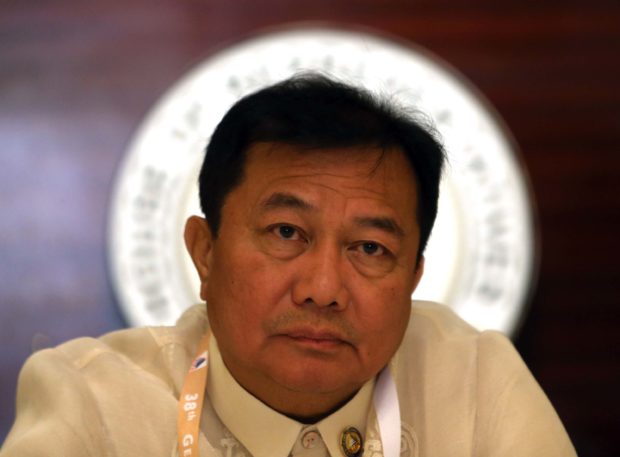A number of lawmakers can’t have their pork—er, cake—and eat it, too, according to the big boss of the House of Representatives.
An unapologetic Speaker Pantaleon Alvarez confirmed on Wednesday that 24 “undesirable” lawmakers lost infrastructure funding for their constituents in the 2018 national budget due to politics, saying they ought to understand the name of the game in the 17th Congress.
“You win some, you lose some. They should understand that you can’t have your cake and eat it too,” Alvarez said in a phone interview with the Inquirer.
Budget Secretary Benjamin E. Diokno said it was the prerogative of Congress to allocate bigger budgets for projects of administration allies while slashing funding for those by the opposition.
Diokno said there were some adjustments. “But there will be a distinction between those who are allies of the administration and those who are not.”
“You know, that was the policy even before martial law [implemented by then President Marcos] … ‘if you’re not with us, you don’t get anything,’” he noted.
Previous administrations
Alvarez, a bosom buddy of President Duterte, said the House leadership’s policy of removing funding and projects from opposition members was no different from previous administrations.
“It’s a question of leadership. I have to take care of my members,” he said.
Alvarez said some allies belonging to the administration-backed “supermajority” had raised complaints about certain districts getting more funds in spite of the lack of cooperation of their representatives.
“That would be unfair to members who are cooperative,” he said.
Among those whose infrastructure projects were scrapped in the General Appropriations Act of 2018 were members of the Magnificent Seven and Makabayan opposition blocs, as well as a number of Liberal Party and administration allies who were not in the good graces of the House leadership.
The local infrastructure funds had originally been approved on third reading in the House version but were taken out and realigned during conference discussions between the Senate and the House. The final version ratified by the two chambers was signed by Mr. Duterte on Tuesday.
Hidden pork
The total funds involved, which had been described as “hidden pork barrel,” could not immediately be verified pending the official release of the budget law, but one Inquirer source claimed it amounted to P11 billion.
Alvarez acknowledged that previous House leaders had typically taken a different approach to appropriating funds for allied or nonallied House members, in which the funds would be included in the budget, but would be released only if they were cooperative.
“In the past, the leadership would fool the members by adding the funds in the budget but the executive would not release these. I don’t want to fool them like that,” he said.
Alvarez offered no apologies to the constituencies of the affected lawmakers who would bear the brunt of the retaliatory budget cuts.
“That’s their own fault. They better talk to their congressmen,” he said.
Bag-ao’s plea
The Speaker confirmed that Dinagat Islands Rep. Kaka Bag-ao had pleaded with him on behalf of her district upon learning of the infrastructure cuts. He said he gave the same response.
“That’s life,” he said.
Also on Wednesday, Albay Rep. Edcel Lagman, Ifugao Rep. Teddy Baguilat Jr. and Akbayan Rep. Tom Villarin—who belong to the Magnificent Seven group—separately issued statements assailing the House leadership’s actions.
“Why punish citizens and communities for the earnest and valiant efforts of their representatives to maintain responsible dissent as the bedrock of democracy?” Lagman said.
“Zero allocations are projected to punish and silence opposition legislators even as it is their constituencies who are deprived of the benefits of infrastructure development,” he said.
Essential infra
Lagman said a great majority of the deleted appropriations were not for “pet projects” but were for essential infrastructures intended for congressional districts under the government’s “Build, Build, Build” program.
“These were not even requested by the affected representatives and were included upon submission by the DPWH (Department of Public Works and Highways) in the President’s National Expenditure Program on which the annual General Appropriations Bill is entirely based,” he said.
Baguilat said his constituents in Ifugao were taxpayers, too. “The allocations would have improved the national roads to the rice terraces and poor upland communities.”
Baguilat said the opposition’s role in Congress was not to obstruct, but to raise a howl when wrong was being committed and to give praise when it was warranted.
Villarin said the retaliatory cuts indicated “pure hubris” on the part of the House leadership.
“The alacrity by which said punishment was imposed reveals the dictatorial nature of the House leadership and the vengeful mindset of the Duterte administration,” he said. —WITH A REPORT FROM BEN O. DE VERA
